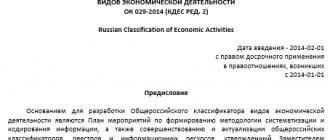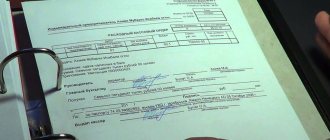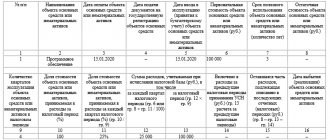Examples of selecting OKVED codes depending on the chosen field of activity
The applicant’s idea of the proposed activity codes does not always coincide with the logic of the structure of the OKVED classifier. For example, it is understandable when it comes to activities related to the rental of apartments and offices. The following OKVED codes are suitable:
- 68.20 Rent and management of own or leased real estate
- 68.20.1 Rent and management of own or leased residential real estate
- 68.20.2 Rent and management of own or leased non-residential real estate
Also, quite logically, activities related to trade or the provision of taxi services are structured. But, for example, a designer associated with Internet advertising can work under the following OKVED codes:
- 18.12 Other types of printing activities
- 74.20 Activities in the field of photography
- 62.09 Activities related to the use of computer technology and information technology, other
- 73.11 Activities of advertising agencies
- 73.12 Representation in the media
- 90.03 Activities in the field of artistic creativity
- 90.01 Performing arts activities
- 62.01 Computer software development
As you can see, when selecting suitable OKVED codes, it is not always possible to limit yourself to one class or classifier group. We recommend that you use a special selection of OKVED codes by type of business:
Ready-made sets of OKVED codes by type of business
How many OKVED codes can be indicated in the application?
As much as you like, it is not forbidden to include at least the entire Classifier in the application (the only question is how much you need it). In the sheet where OKVED codes are indicated, you can enter 57 codes, but there can be several such sheets, in this case the main type of activity is entered only once, on the first sheet.
Please note that if the OKVED code you have chosen relates to the field of education, upbringing and development of children, medical care, social protection and social services, youth sports, as well as culture and art with the participation of minors, then to register an individual entrepreneur you will need a certificate of no criminal record (clause 1(k) of article 22.1 of law No. 129-FZ). The document is submitted upon an interdepartmental request, but in order not to delay the registration process, you can, after checking with the registration inspection about this possibility, request a certificate in advance.
The law stipulates this requirement only for individuals, that is, individual entrepreneurs, and when registering an LLC such a certificate is not required.
How many OKVED codes can be specified when registering an individual entrepreneur
The future individual entrepreneur must fill out an application for registration of a citizen as an individual entrepreneur using form P21001. The types of activities that he intends to carry out are prescribed by OKVED codes in sheet A.
The entrepreneur needs to decide on the main direction of the business and write down its code in section 1 of sheet A. Section 2 includes additional codes - there can be as many of them as you like, the legislation does not limit the entrepreneur in this matter. That is, the individual entrepreneur has the right to indicate 1 code (this is the minimum), and then, if desired, it can be 5 codes, or 20, or 30... If all the desired codes do not fit on one sheet, several are filled in (clauses 2.16.2, 14.11 Requirements for the preparation of documents submitted by business entities during registration, approved by Order of the Federal Tax Service of Russia dated January 25, 2012 No. ММВ-7-6 / [email protected] ).
NOTE! The requirements for indicating OKVED are such that each code must consist of at least 4 digits. Thus, not only the class and subclass are specified, but also at least a group of activities. For example, if an entrepreneur wants to engage in retail trade, then using OKVED codes he will register what exactly he intends to sell and how the trade will be carried out. For example, OKVED code 47.51 means that an individual entrepreneur will retail textile products in specialized stores, and 47.81 means that retail trade in food products, drinks and tobacco products will be carried out in non-stationary retail outlets and markets.
Responsibility for conducting activities not in accordance with OKVED
As such, there is no liability for activities not in accordance with OKVED. Both judicial practice and letters from the Ministry of Finance confirm that an entrepreneur is not subject to liability for carrying out activities not specified in the Unified State Register of Individual Entrepreneurs or the Unified State Register of Legal Entities.
At the same time, if you operate under an OKVED code that is not registered or was not entered later, you may be brought to administrative liability in the amount of up to 5,000 rubles under Art. 14.25 of the Code of Administrative Offenses of the Russian Federation for “...failure to submit, or untimely submission, or submission of false information about a legal entity or an individual entrepreneur.” OKVED codes are included in the list of such mandatory information in Art. 5 (5) of Law No. 129-FZ of 08/08/01, so you will need to hurry to make changes within three days after the start of activities under the new code.
Main activity according to OKVED
But here you need to be careful. The fact is that the calculation of contributions for workers for insurance against industrial accidents and occupational diseases occurs according to the tariffs for the main type of activity. The more risky (traumatic or provoking occupational diseases) the activity is, the higher the insurance premium rate.
Before April 15 of the year following the reporting year, employers must submit to the Social Insurance Fund documents confirming the main type of activity, in the manner prescribed by Order of the Ministry of Health and Social Development No. 55 of January 31, 2006. Organizations submit such confirmation annually, and individual entrepreneurs - employers only if they have changed their main type of activity. The main type of activity is considered to be the type of activity from which the income received is higher in comparison with the income from other activities for the previous year.
If confirmation is not submitted, then the FSS sets the highest tariffs of all types of activities specified by the policyholder, and this is where excessively specified OKVED codes can turn out to be very inappropriate.
Change and addition of OKVED
OKVED indicates one type of activity as the main one. According to this profile, the company must receive at least 51% of the income. The remaining codes are indicated as minor. There are no violations if you receive part of the income under contracts not related to the main type of activity, or not specified at all according to OKVED. It is important that the main income is received from the type of activity that is considered the main one. Otherwise, you should change the constituent documents and, accordingly, receive a new OKVED.
Codes change:
- in connection with changes in information about the company (IP);
- due to the opening of new activities;
- when correcting errors.
Is it necessary to make changes to the list of codes in 2017?
There is no need to specifically change the old code (in the interpretation of regulatory documents from 2007) to a new one. If OKVED is not confirmed or has not been changed, then the FSN will perform the recoding in its accounting documents independently.
At the beginning of business activity when forming a company, the OKVED code should be registered before applying to the Federal Tax Service, but immediately after registering the individual entrepreneur or company. And regarding changes in the scope of activity of an existing company, it is better to do the opposite: you should contact the Federal Tax Service to change the Unified State Register of Legal Entities (USRLE).
How are tax regimes and OKVED codes related?
All special, or preferential, tax regimes (USN, Unified Agricultural Tax, PSN) have restrictions on the type of activity. If you intend to engage in certain types of activities and at the same time choose a mode in which such activities are not provided, then there is a conflict of interest. It will be necessary to change either the tax regime or the desired OKVED. To avoid getting into such a situation, we recommend that you consult with experts in advance on the issue of choosing an appropriate taxation system.
Free tax consultation
For example, under the simplified tax system 2021 it is impossible to carry out insurance activities, extract minerals, except for common ones, or produce excisable goods, except for grapes and wines made from them. On PSN you can only provide certain types of services and engage in retail trade with restrictions.
Read more: Types of activities covered by patent in 2021 for individual entrepreneurs
Unified agricultural tax is generally intended only for activities related to agriculture and fisheries. The general taxation system (OSNO) has no restrictions related to types of activities, but it has the highest tax burden.
Tax disputes related to activities under an unspecified OKVED code
The entire “reinforced concrete” logic of tax officials is based on their constant desire to not recognize the taxpayer’s right to a tax benefit or to reduce the tax base. Everything comes into play here, including the refusal to accept expenses for transactions with counterparties if they do not indicate the type of activity for which the business transaction took place.
Most often, such refusals are associated with the recognition of expenses when calculating income tax and VAT refund. Judges in such disputes, as a rule, side with the businessman, but if you do not want to bring the matter to court, then it is better to make sure that your partner has the required OKVED code.
Another important point is when tax authorities unreasonably try to prove that activities under an unspecified OKVED code are, in principle, not entrepreneurial. In particular, there are known denials of the right to apply a tax rate of 6% for an entrepreneur on the simplified tax system for income if he received this income under unspecified OKVED codes. The Federal Tax Service is trying to tax such income with personal income tax at a rate of 13%, as received by an individual from activities not related to business.
Activities and taxes
The choice of OKVED also affects what taxes and at what rates the entrepreneur will have to pay. The Russian tax system has 5 tax regimes, 4 of which are preferential and intended for small businesses. For the application of each of them, different conditions have been introduced, for example, the maximum number of employees, the maximum annual income. This choice directly depends on the type of activity. These tax regimes are:
- Basic system (OSNO). An entrepreneur can use it for any activity. You will have to pay tax on income minus expenses at a rate of 13%, as well as VAT at a rate of up to 20%, which is often unprofitable.
- Simplified system (STS). You can choose one of two options - pay 6% on all income or 15% on the difference between income and expenses. The types of activities of individual entrepreneurs under the simplified taxation system can be almost any, although there are still minor restrictions (clause 3 of Article 346.12 of the Tax Code of the Russian Federation). The simplified tax system cannot be used in the production of excisable goods, extraction and sale of minerals, with the exception of common ones. This system is also not used in financial activities - banking, insurance, investment, pawnshop, microcredit. But we have already said that for individual entrepreneurs all this activity is prohibited in any case.
- Patent system (PSN). The tax does not depend on the amount of income, but on the type of activity. The cost of a patent is calculated at a rate of 6% of the potential income of an individual entrepreneur in the chosen field. PSN is introduced by the municipal authorities of the constituent entity of the Russian Federation, so it is necessary to take into account the peculiarities of regional legislation. Starting from 2021, the authorities of the constituent entities will also approve a list of activities for which the patent system is suitable. Their indicative list, as well as the list of activities prohibited on the PSN, are given in Article 346.43 of the Tax Code of the Russian Federation.
- Unified Agricultural Tax (USAT). Applicable only to agricultural producers. These are organizations and individual entrepreneurs that are engaged in livestock farming, crop production, as well as industrial processing of agricultural products. The details of the activities for which the unified agricultural tax can be applied are given in Article 346.2 of the Tax Code of the Russian Federation. The tax rate is 6% of the difference between income and expenses, but in addition to this, from 2021 you need to pay VAT.
- Professional income tax (PIT). The newest regime, which can be applied by individual entrepreneurs on an equal basis with self-employed persons. It is prohibited to engage in wholesale and retail trade (except for the sale of goods manufactured independently), including the sale of excisable and marked goods, the extraction and sale of minerals, and the carrying out of intermediary activities under contracts of agency, commission or agency agreement.
So, the possibility of applying preferential tax regimes and the cost of a patent directly depend on the type of activity. In addition, for individual entrepreneurs using the simplified tax system and special tax system, regional authorities can introduce “tax holidays” - reducing the tax rate to zero. Again, the ability to take advantage of the benefit depends on the type of activity. Vacations are allowed only for entrepreneurs in the production, scientific and social spheres, as well as in the sphere of consumer services.
How to report a new OKVED code or exclude the previous code
Above, we have already noted the need to inform your tax office within three days that you have changed the types of activities you carry out. Individual entrepreneurs report changes (adding or deleting) OKVED codes using form P24001.
Organizations submit a notification of changes to OKVED codes, regardless of whether changes are made to the charter or not, in form R13014. The fact of changes in the charter is taken into account when filling out the form itself.
Change of OKVED for LLC in Moscow on a turnkey basis
Konstantin Fedyaev, lawyer at Acsour
What is different about the new edition of the OKVED classifier?
Currently, there is one edition of the classifier of types of economic activities - OKVED 2 (NACE Rev. 2), previous editions have lost their force as of January 1, 2021.
The new edition of OKVED 2 is applied by tax authorities when registering legal entities and individual entrepreneurs from July 11, 2021. According to reporting forms, OKVED 2 began to be used in January 2021.
The new OKVED 2 classifier is noticeably different from its predecessor: it is more detailed, which allows you to more accurately determine the type of activity of a company or individual entrepreneur.
Why do you need to confirm the OKVED code in the FSS? How to do it?
Companies are required to confirm their main activity with the Social Insurance Fund. Based on this information, the FSS determines the class of occupational risk and also sets the rate of contributions for injuries. The main type of activity had to be confirmed no later than April 15 of the year for which the FSS sets the tariff. Since April 15 was a holiday in 2021, the deadline for confirmation according to the rules was moved to the next working day - April 16.
Based on the calculations, a certificate confirming the main type of economic activity, as well as an application for confirmation of the main type of economic activity, is submitted to the territorial division of the Social Insurance Fund. The type of activity will be recognized as the main one for the current year if it has the largest share in the company’s income. If several types of activities have the greatest weight, then the main type of activity will be the one that corresponds to the highest class of professional risk.
How to inform the tax office about a change in the type of activity?
Sole proprietors report the addition or deletion of activities to the tax authorities on Form P24001.
Companies should check the Articles of Association before making changes. If the list of activities in the Charter is open, then there is no need to make changes to the Charter. In this case, the company reports the changes on Form P14001.
If the new OKVED codes do not apply to the types of activities specified in the charter, and the charter does not indicate that the company has the right to carry out other types of activities not prohibited by law, then in this case it is necessary to amend the charter in the form P13001, and it is also necessary to pay a fee in in the amount of 800 rubles.








